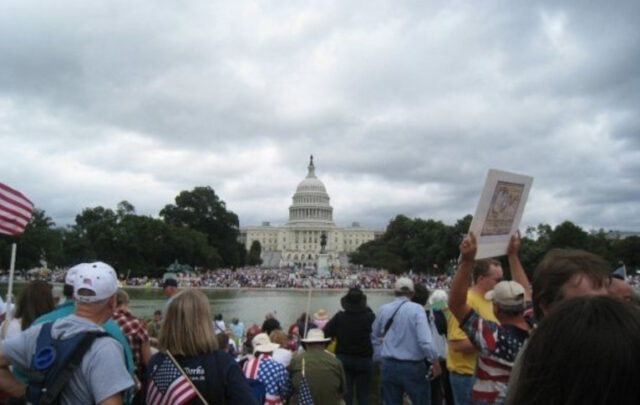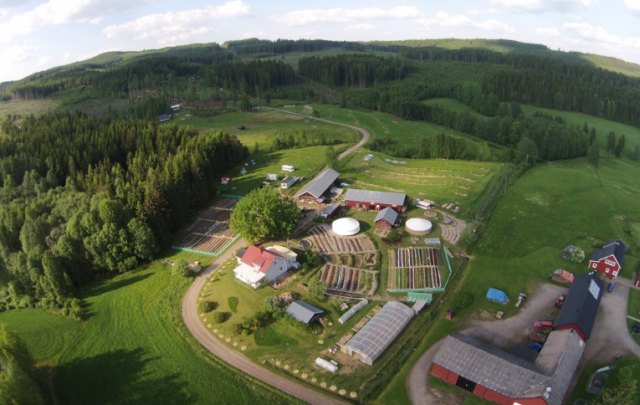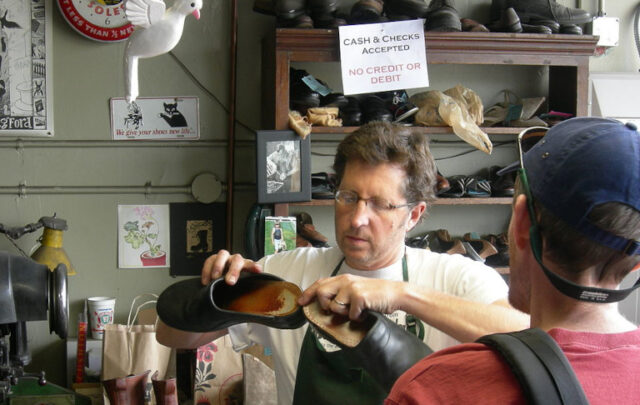In their invigorating booklet, “Organizing Cools the Planet,” Joshua Kahn Russell and Hilary Moore advise us to “find our frontlines” – an approach pioneered by the Oakland-based activist organization Movement Generation – if we want to change the world. By this, they mean “finding ways to navigate the multiple crises that are already challenging our lives…. What we do in the next two years will determine the landscape for the next ten years, which will determine the landscape for the next one hundred years.” Their deadline rings as true today as when they wrote these words in 2011.
Because of this timeline imposed on us by Nature (and revealed by science), social movements must ask new questions that we wouldn’t be asking if we had all the time we wanted. Because ecological collapse is embedded in all aspects of life on this planet, we need to think about scale in new ways. Social movements need to make unlikely alliances that we wouldn’t otherwise make. We therefore need a political compass with which to navigate these choices in a strategic and principled way.
Further inspired by Patrick Reinsborough, Kahn Russell and Moore note that “Climate Justice calls on us to ‘Think structurally, act strategically’ (though it may not be as catchy on a bumper sticker). Therefore, if your frontline doesn’t offer immediate action opportunities (or if they are not impactful at this moment), you need to align it with other frontlines.”
In the middle of July, I was one of eighteen scholars (plus one via Skype) who gathered in the lakeside town of Bellagio, Italy, to address the theme of “Climate Futures: Re-imagining Global Climate Justice.”
We came from seventeen countries, range in age from our twenties to our sixties, live on six continents (Antarctica wasn’t directly represented), and included in our number scholars, activists, journalists, former UN climate negotiators, and climate scientists, with many of us wearing more than one of these hats. We commented often on this invigorating diversity of background, and sought to make of it a strength. Yet, in one of the ironic twists that a crazy and unequal world offers up, we had gathered in a place of privilege, the Rockefeller Foundation Center on scenic Lake Como, Italy, a playground for the rich and a gorgeous setting made possible by a funding institution built on oil money (though it has now joined the ranks of those who have listened to the divestment movement). Most of us have jobs that don’t require backbreaking work, and the comfort of homes, the advantages of education, and a basic level of security in our lives. But nothing is guaranteed any longer in a world that can change in an instant, and is changing slowly all around us.
Where were our frontlines? Each will speak for themselves. Mine are most obviously in the university setting where I work, in the small but growing network of North American ecosocialists of System Change Not Climate Change, in a radical think tank called the International Institute of Climate Action and Theory, in our plucky local 350 group, and with a creative band of activist scholars at the Climate Justice Project.
All of us had such local roots and wider connections, no doubt.
My co-organizers Debashish Munshi and Priya Kurian are articulating the concept of “sustainable citizenship” in their work on climate policy and action at the University of Waikato, New Zealand. Co-organizer Kum-Kum Bhavnani, like me based in the Sociology Department at the University of California, Santa Barbara, has helped pioneer the framework of “women, culture, and development” or WCD, an attempt to inspire scholars who work at these intersections which shape the possibilities of much of the world, for determined action in communities and global networks. The four of us are editing the new edition of Feminist Futures: Re-imagining Women, Culture and Development (first edition Zed Press, 2003) – I guess we like to re-imagine things! Many of us have worked in education, from the village and community level like Sangion Tiu from Papua New Guinea, to the university and global community, such as Anabela Carvalho from Portugal.
Bill McKibben, who couldn’t be with us in person, sent a video, in which he states “Climate justice may be the most important two words that we’ve got now, the most important phrase on the planet. It’s a way to unlock enormous power because it unites the scientific, and the moral, and the practical discourse on this earth and it gets them going in the same direction…. The good news is that if we deal wisely with this problem, this crisis, then we’re going to build a world that works better than the one we have right now, a world that works fairly, is more democratic, less unequal.”

Photo by John Foran. Image by Summer Gray.
If there was substantial agreement among the group on the state of crisis humanity faces, and on where the frontlines of the impact of climate chaos are, and on what climate justice is, we nevertheless had a healthy variety of opinion on how to get it, on, and much else besides.
As a group, one of the points of pressure we concentrated on the looming nightmare of COP 21 in Paris this December — the UNFCCC climate treaty negotiations, which the global climate justice movement must inevitably confront in a few short months, and live with its outcome after that. While no one expects much of the fatally flawed and compromised climate negotiations that are supposed to finalize an “agreement” of some kind at the end of the year in Paris at COP 21, it is a place where a good part of the world’s attention will be turned, at least to some degree. It will also likely be the site of intense narrative and political contention over the value and outcome of the negotiations, since world leaders, especially of the global North, will be seeking to declare a victory on the basis of some common text they will do everything in their power to get their counterparts all over the world to sign onto.
Being at a COP sometimes feels like “looking in the face of the enemy,” commented Anna Pérez Català, a young activist from Barcelona who had this feeling when she attended her first COP last year in Lima. It’s a place where every delegate, in the eyes of former Maldives Minister of Environment Mohamed Aslam, should be replaced and the entire process up to now should be condemned (he said this not in Bellagio, but via Skype during COP 18 in Doha, Qatar in 2012, which he was unable to attend due to the coup against President Mohamed Nasheed; the heart-breaking struggle of Aslam and Nasheed to bring climate justice to the floor of COP 15 in Copenhagen in 2009 is chronicled in the film Island President). He asked us: “Can someone’s life be negotiated? Justice remains elusive.”
Patrick Bond judged the COP a distraction; markets and capitalism frame the system we have to change. But others countered that the COP is also a space where, despite the unequal nature of the process, at least a few things could happen that will save lives in our coming future. From a certain point of view, the COP is a concentrated distillation of the system, not a distraction. If the problem is capitalism, you have to take the COP seriously on some level.
Ahsan Uddin Ahmed, who has mobilized his climate science to advise the government of Bangladesh and the 160 members of parliament, is also working with civil servants, journalists, and villagers. Social scientist Qi Ye will do the same for his part of the world; he works in the realm of climate policy, with an eye to shaping progressive initiatives inside the Chinese political establishment. He pointed out that of the 150 million or more Chinese viewers of Under the Dome, the film exposée of urban pollution that streamed for just three days earlier this year before authorities removed it from the web, the majority will have been young people. Theirs will be among the many strong voices of climate scientists who insist that world leaders wake up to the realities of a climate-changed world and take bold action, all the while knowing in their hearts that their “political masters” lack the guts to rise to the occasion. The most eloquent voice on this front is that of James Hansen, who recently castigated the “reticence” of climate scientists in an essay that reports “continued high emissions would result in multi-meter sea level rise this century and lock in continued ice sheet disintegration such that building cities or rebuilding cities on coast lines would become foolish.” Noting that the stated goal of 2°C is not a safe target, he concludes: “The bottom line message scientists should deliver to policymakers is that we have a global crisis, an emergency that calls for global cooperation to reduce emissions as rapidly as practical.”
In Bellagio, we all agreed on one thing: Paris will attract large numbers of climate activists, concerned citizens, good, bad, and indifferent NGOs, young people, old people, journalists and communicators of every stripe. About half of our group plan to be there: seasoned scholar activist Patrick Bond from South Africa, youth organizers Anjali Appadurai from Canada, Majandra Acha from Peru, and Reem Al Mealla from Bahrain, former Philippines negotiator Yeb Saño, who electrified COP19 in Warsaw in 2013 at the opening plenary, and myself among us.
The various parts of the climate movement itself have proposed a variety of approaches: some, like Avaaz and its NGO allies will organize a massive march before the COP even begins, thinking to inflect the negotiations in the direction of something that can lay the foundations to somehow save the planet. They intend to take the rhetoric of global leaders and turn it into a weapon with which to shame or encourage them into doing the right thing.
Patrick Bond has already questioned the wisdom of this strategy: “Avaaz are not only embarrassingly contradicted on their right flank. The organisation’s premature celebration is dangerous. After all, the conservative (pro-market pro-insiderism anti-activism) wing of ‘climate action’ politics – as distinct from climate justice advocacy – is gaming us all now, arguing that the Paris COP21 can result in a victory. Avaaz just amped up that narrative.”
The more radical climate justice movement has been trying to find strategies of repudiation of the UNFCCC and the Paris process and outcome, together with organizing to build numbers and turn the larger movements and NGOs in a more radical, ultimately anti-capitalist direction. Some will pursue direct action in many forms and concrete acts, others will create spaces to articulate and build post-Paris visions of climate justice, and many will be communicating with their frontlines back home.
There are other possibilities for climate justice around (if not in) Paris, some of which will involve members our group.
Yeb Saño, inspired like millions of others by Pope Francis’s bracing climate encyclical Laudato Si, has been helping to build the People’s Pilgrimage, which, like the encyclical itself, is open to people of all faiths (including the climate justice faith). As he said: “Paris is not our destination. Our real destination will be the hearts and minds of people, so our journey continues even after Paris.” He told us: “Paris is merely a six-year delay of what was promised in Copenhagen. Paris will give us a ten to fifteen page ‘Motherhood’ statement with lots of ‘creative ambiguity.’ Unless we change the system, the same system that got us into the crisis, the negotiations process cannot, for the life of me, I cannot see it get us out of it.”
Majandra Acha and Anjali Appadurai will no doubt be using both inside and outside tactics to build the global climate justice youth movement. Erica Violet Lee will seek ways to articulate and strengthen the demands of indigenous communities, along with her organization, the amazing Idle No More. Reem Al Mealla simultaneously helps build the Arab Youth Climate Movement and participates in policy discussions that ultimately rise up to the Arab world’s governments and negotiators. Cherelle Jackson, the one true climate journalist among us, works for the same goals on her frontlines, Samoa and the small island states of OASIS, with youth, NGOs, and policymakers, desperate to draw the existential plight of these frontlines to the attention of governments and other powers that be. Anna Pérez Català is similarly at home (as much as anyone can feel at home in our present circumstances) among the indignados who brought hope to the streets of Spain in 2011 and continue to imbue grassroots politics in that country, and coordinating the making of the climate action plans of her region, Catalonia.
Mithika Mwenda, Secretary General of PACJA, the Pan African Climate Justice Alliance, a network of more than one thousand organizations, holds no hope for the negotiations, but will insist, both inside and outside the negotiations, on climate justice in the massive frontline of Africa.
Sunita Narain, Director General of the Centre for Science and Environment (CSE) in New Delhi, told us over Skype about the Centre’s initiative to concretely and precisely analyze the INDCs [Intended Nationally Determined Contributions] that have emerged at the COP as the weak neoliberal replacement of the original UNFCCC foundational goal of a legally binding climate treaty. Each country in the climate negotiations has to put their INDC (with the emphasis on the “I” for “intended” – you can see those which have been submitted so far here) for climate mitigation on the table before Paris. These should be scrutinized for their effectiveness, ambition, and contribution to equity. Narain blamed the United States for shifting the discourse away from binding emissions targets to the misnamed “bottom-up” hodgepodge of pledges, and noted that former U.S. negotiator Todd Stern’s definition of “equity” is that “every country has the right to determine its level of emissions,” while his definition of “national circumstances” for the United States is the political fact of a Senate dominated by Republicans. Narain predicts that Paris will end up being “a massive exercise in making it look like they [the major emitting countries] are doing something.”
Patrick Bond is part of ongoing strategy discussions among global activists, some of which are taking place on a new website, The Road to Paris, where all are invited to join in that conversation. Back in March, Bond wrote from a meeting of members of the movements at the World Social Forum in Tunis: “If you are serious about climate justice, the message from these [past] COP experiences is unmistakable. Going inside is suicide.” He and others have raised the possibility that we might be able to “Seattle Paris,” as suggested by Canadian author and activist Pat Mooney of ect: “It should start like New York [where 400,000 marched together in September 2014] and end like Seattle [where the global justice movement shut down the meetings of the WTO in December 1999]. Shut the thing down!”
And what do I think? I continue to believe that many approaches hold promise. We need to be active everywhere, so we can say, as the global justice movement did before us: “We Are Everywhere.” Our movements – if they are real – can’t be competing with each other. They must learn to work together.
We should be trying to identify the strategies that give us the best chances of creating “tipping points” in the climate wars. I dream of a movement that can create a non-linear trajectory into the future.
One idea I am working on is a COP21-focused campaign for “Just Climate Futures: Saying No in Paris.” The best “outcome” for the COP would be NO treaty/agreement. A complete collapse, as with the WTO in Seattle, where there was NO possibility of declaring the outcome a success.
COP 21 is the best chance for all those countries (and there are many) who will get very little out of the treaty on the table to use their veto and say “No, not without the $100 billion for the GCF, not without substantial money for Loss and Damages, not without closing the emissions gap so our populations don’t starve, drown, die of thirst, get killed in floods, not without free technology transfer, and much more!”
With people everywhere who are truly concerned about the planet’s future we need to discredit the COP and not let it declare victory.
I believe that the movement should be seeking ways to bring this about.
If anyone agrees, the next questions are: how do we do that? Whom do we work with? How do we communicate this? Who is already working toward this end?
Stay tuned for more on this, and other initiatives generated by our group while in sunny Bellagio…






